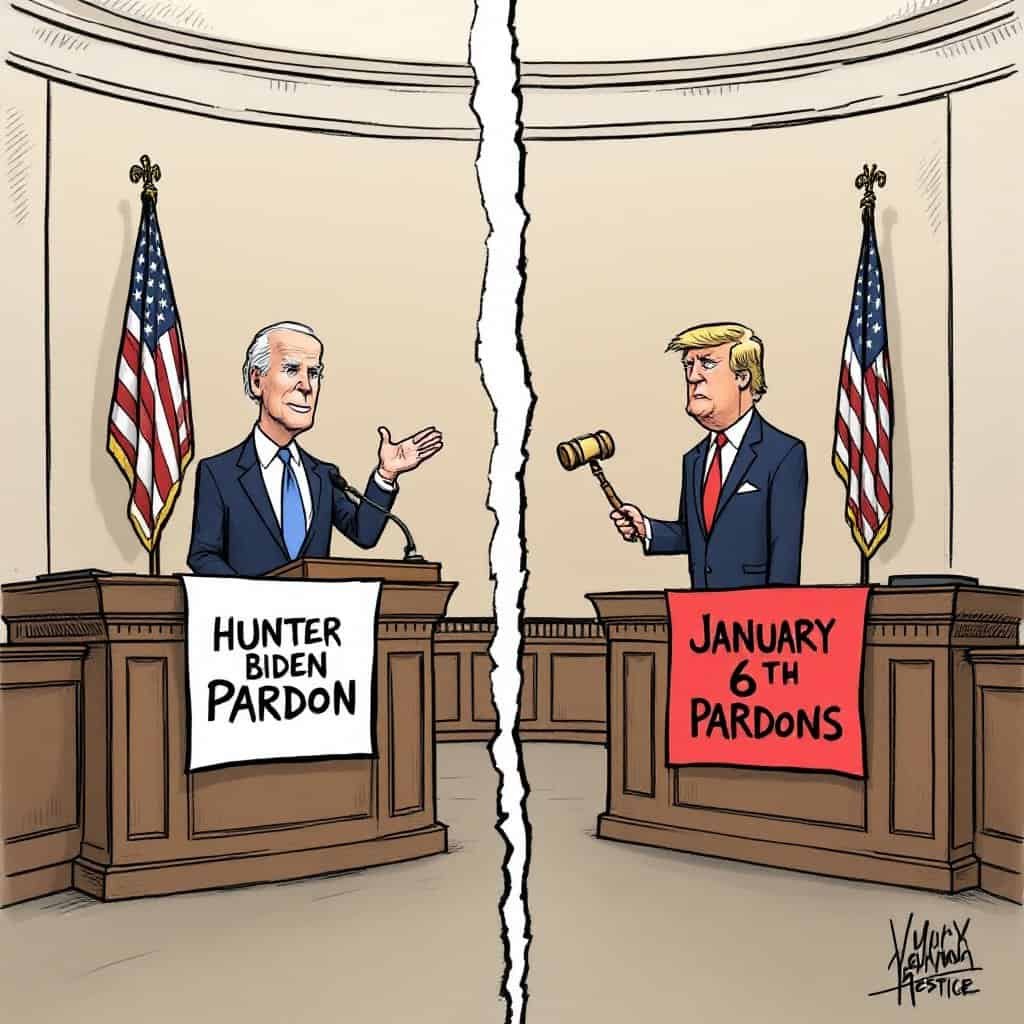No one is above the law. The recent decision by President Biden to pardon his son, Hunter Biden, has sent shockwaves across the political spectrum. It’s not merely about the act itself but the broader implications for justice, political standards, and clemency practices in this nation. What’s undeniably fascinating is how this controversial move could influence President-elect Donald Trump in his potential pardoning of certain January 6 defendants. Let’s break this down and understand why this story is far larger than just the Bidens and Trump.
Setting the Stage with Hunter Biden
President Biden’s pardon of his son stands as a sharp deviation from traditional presidential norms. After previous promises from the White House that such an act wouldn’t occur, the decision has left many questioning its motivations. Biden chalked it up to Hunter facing what he called “selective and unfair prosecution,” hinting at biases within the Department of Justice.
Those on the left have found themselves in a political pinch, with some Democrats uneasy over the potential backlash this could fuel. The sentiment “no one is above the law” has been the go-to argument in defending DOJ actions against Donald Trump. Yet, for President Biden to deliver this clemency has undoubtedly taken the wind out of those sails within his own party. Republicans, on the other hand, view this maneuver as ripe justification for broader clemency considerations by Trump.
Trump, Clemency, and January 6
Enter President-elect Trump, who has long teased the notion of pardoning some January 6 defendants. Unlike the broad strokes critics paint of those involved in the Capitol events, Trump appears to be honing in on specific cases, particularly non-violent offenders or individuals already burdened with severe sentences. Could Hunter Biden’s pardon embolden him further? Many would argue that it provides a compelling contrast he could use.
Comparison: Biden’s Pardon vs. Trump’s Potential Pardons
| Aspect | Biden’s Pardon of Hunter | Trump’s Potential Jan 6 Pardons |
|---|---|---|
| Recipient | Family member | Non-violent offenders |
| Justification | “Selective and unfair prosecution” | Heavy-handed DOJ actions |
| Political Impact | Backlash from both parties | Potential support from base |
| Precedent | Deviation from norms | Follows historical clemency practices |
After all, the Biden-Harris Administration’s DOJ actions against those present at the Capitol have come across to many as heavy-handed, especially after the Supreme Court recently constrained the interpretation of the “obstruction of an official proceeding” statute. With sentence reductions already applying to some offenders, Trump sees opportunity to weave the narrative of fairness and justice into his clemency decisions. And why shouldn’t he? If a president can pardon their family for subjective reasons despite public criticism, then surely offering leniency to those unfairly prosecuted shouldn’t be considered political theater.
The Case for Selectivity
This isn’t about mass blanket pardons but rather case-by-case decisions that account for the differences in involvement and outcomes of January 6. For non-violent actors such as Adam Johnson (often remembered as “Podium Guy”) and Jacob Chansley (“QAnon Shaman”), who have served significant time for their roles, clemency could offer a second chance. For violent participants or those leading the chaos, clemency might not come as easily—but the rhetoric surrounding selective justice would remain.
In framing his clemency decisions, Trump has a path that avoids vilifying the entire DOJ while still addressing perceived prosecutorial zealotry. Such clarity stands to appeal even to moderate Americans tired of divisive politics. Why? Because second chances resonate with a part of our shared humanity. These moves could challenge the left’s overreach while still upholding responsibility where warranted.
Republican Values: The Bigger Picture
While Democrats often claim progressive policies are compassionate, it is Republican ideals that truly embody fairness over shortcuts. Republican clemency leans into principled conservatism—tackling judicial overreach without abusing executive powers. Conservative values, such as individual responsibility and balanced justice, flourish when powers act as a guiding hand to restoration, not revenge.
Conservative vs. Progressive Approaches
- Conservative:
- Balanced justice
- Individual responsibility
- Restoration over revenge
- Progressive:
- Government intervention
- Punitive extremes
- Short-term gains
This entire episode is eerily reminiscent of this difference in philosophy. Conservatives favor broader tax bases and private-sector growth over endless government intervention, much like how this balanced clemency approach prioritizes fairness over rashness. Lowering punitive extremes doesn’t weaken the law; it strengthens it—just as lower taxes grow both businesses and families. And just as reckless liberal overreach stifles economic growth while chasing unsustainable short-term gains, so too does unchecked government prosecution fail the long-term trust of the public.
Public Trust or Partisan Pandering?
That’s what it all boils down to: public trust. Biden’s pardon of Hunter risks alienating even centrist allies who view it as a political miscalculation. Trump, meanwhile, faces his own tightrope walk should pardons go forward. How the American people perceive clemency—as an act of statesmanship or partisanship—will dictate the legacy of these decisions.
Republicans in Congress have already hinted that Hunter Biden’s pardon is just the tip of the iceberg that warrants investigations into DOJ inconsistencies under the Biden-Harris Administration. If Democrats cry foul about normalization of January 6 leniency, they should reflect on where ignoring equal application of justice might lead.
The Road Ahead
At its core, this situation has been about more than Hunter, Trump, or even the Capitol. It lays bare the complexities involved whenever power itself judges fairness. For Trump, strategically addressing overreach while showing grace could add serious credibility to his bid for a stronger America.
But one thing remains clear: America thrives when justice acts impartially rather than politically. Conservatives should champion a just and fair system that lifts law-abiding citizens while allowing a measured opportunity for rehabilitation. After all, isn’t that just another way of doing what Republicans do best: fueling growth—whether it’s in the economy or confidence in our institutions?
Table of Contents
- Setting the Stage with Hunter Biden
- Trump, Clemency, and January 6
- The Case for Selectivity
- Republican Values: The Bigger Picture
- Public Trust or Partisan Pandering?
- The Road Ahead






